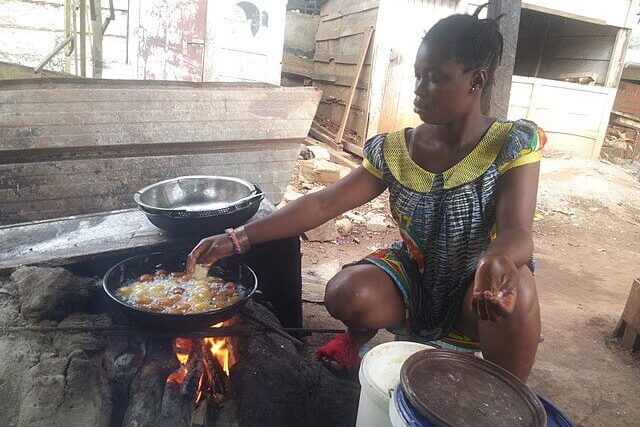
Clean cookstove projects, touted as one of the foremost carbon-offset initiatives, may have been overstating their climate benefits by an average of 1,000%, suggests a recent study.
Annually, an estimated 3.2 million individuals suffer premature deaths due to household air pollution stemming from cooking with smoky fuels like wood, paraffin, or kerosene, which contribute approximately 2% of global greenhouse gas emissions. This mode of cooking accelerates deforestation and habitat depletion as communities resort to tree felling for fuel.
Transitioning from these smoky fuels to cleaner alternatives, such as electric cookers, within cookstove projects in developing regions can yield significant health, social, and environmental advantages. These include enhanced air quality, decreased time spent gathering wood, and a slowdown in global forest loss.
To finance such work, often referred to as “nature-based solutions,” projects capitalise on the reduction of greenhouse gas emissions by selling carbon credits. Each credit represents a tonne of carbon dioxide, which companies utilise to offset their emissions, sometimes branding their products and services as “carbon neutral.”
The quest for improved access to clean cooking facilities is enshrined in the UN sustainable development goals, with credits stemming from cookstove initiatives experiencing an uptick. Statistics from the Berkeley Carbon Trading Project indicate that from May to November of the previous year, cookstove projects dominated the issuance of new credits in the market, accounting for about 15% of the total, and also spearheaded new project registrations.
However, a recent study published in the journal Nature Sustainability casts doubt on the claimed climate benefits of cookstove projects generating carbon offsets, alleging an overstatement of 1,000% on average.
This conclusion, however, has been contested by leading certifiers of carbon credits, Verra, and Gold Standard, arguing that the evidence does not substantiate the findings.
An assessment conducted by researchers at the University of California, Berkeley, revealed that while many offsetting schemes purported to fund “clean” cookstoves, the majority failed to meet World Health Organization standards.
Examination of common protocols governing offset production unveiled allowances for overstating stove usage frequency and the resultant benefits for nearby forests, thus inflating the purported climate and biodiversity gains.
These findings build upon prior research by development economists, exposing a consistent failure of cookstove schemes to deliver anticipated benefits in practice.
Despite these challenges, the researchers propose reforms to the carbon credit production regulations to establish a credible source of climate finance for companies. They offer a methodology to prevent the overstatement of impact, which some cookstove companies have begun to adopt during the peer-review process of the paper.
The lead author, Annelise Gill-Wiehl, a PhD student at the University of California, Berkeley, said: “Comprehensively assessing the five major cookstove offset methodologies, we find that our sample of 40% of the market is 9.2 times over-credited. Extrapolating to the entire market, we find roughly 10 times over-crediting.
“Over-crediting replaces direct emission reduction and other more effective climate mitigation activities, even if some reduction is achieved. Lack of trust weakens the market,” she said.
This study emerges amidst heightened scrutiny of the largely unregulated voluntary carbon market, amidst concerns over the proliferation of valueless carbon offsets.
Barbara Haya, co-author of the study and director of the Berkeley Carbon Trading Project, emphasises the necessity of enhancing the quality of carbon credits.
“A carbon credit market built on exaggerations is destined to fail. Our hope is that the specific recommendations we offer can help make clean cookstoves a trusted source of quality carbon credits,” she said.
Gold Standard, a prominent carbon credit certifier, challenges the study’s findings, asserting its method as the most robust, with only a 1.5-fold over-crediting.
“Gold Standard welcomes academic scrutiny and has engaged extensively with the authors of this study,” a spokesperson said, adding that it had already incorporated some of the ideas and changes discussed in the research.
“It must be stressed that the study neither studied, nor found, over-estimation. The evidence provided does not back the conclusions drawn – which are at odds with the wider academic literature and expert view on this subject.”
In response, Verra, the world’s largest carbon standard, expresses disappointment at the continued focus on the study, highlighting ongoing efforts to develop a new methodology for cookstoves.
“As detailed in a September 2023 open letter from researchers and experts, there are numerous substantive concerns about this research,” it said.
This revised approach incorporates current best practices and implements various measuring techniques to verify stove usage.
“Carbon finance is critical for the implementation/sustenance of improved cookstove projects, which provide access to sophisticated cooking methods and a range of other sustainable development benefits to disadvantaged communities,” it said.
Ben Jeffreys, CEO of cookstove company ATEC, collaborates with UC Berkeley to refine impact measurement methodologies, affirming support for the research’s objectives.
“Ensuring ‘a tonne of emission reductions is actually a tonne’ is critical if we are to reach the full potential of the cookstove carbon-market sector,” he said.
——————————————————————————
At Natural World Fund, we are passionate about stopping the decline in our wildlife.
The decline in our wildlife is shocking and frightening. Without much more support, many of the animals we know and love will continue in their decline towards extinction.
When you help to restore a patch of degraded land through rewilding to forests, meadows, or wetlands, you have a massive impact on the biodiversity at a local level. You give animals a home and food that they otherwise would not have had, and it has a positive snowball effect on the food chain.
We are convinced that this is much better for the UK than growing lots of fast-growing coniferous trees, solely to remove carbon, that don’t actually help our animals to thrive.
This is why we stand for restoring nature in the UK through responsible rewilding. For us, it is the right thing to do. Let’s do what’s right for nature!
Donate today at https://naturalworldfund.com/ and join in the solution!

